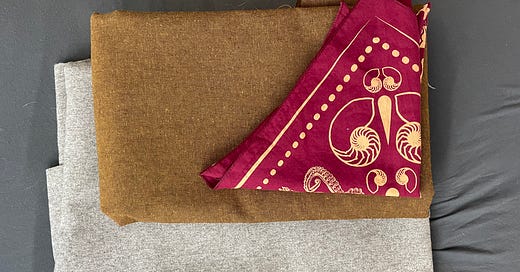An Emerging Language
“Culture Therapy is a conversation about a belief that culture is mental health. We can start this conversation differently.” This is the closing remark of the first post in this Substack. The remark is two months old and I have had a conversation about Culture Therapy every single day in those two months.
Part of me looks back and asks, “am I closer to the thing that this will become?” Part of me is realizing that the thing is already happening. A movement is building, a language is forming, and a culture is emerging.
In For the Culture, Marcus Collins defines culture as consisting of four elements: beliefs, artifacts, behaviors, and language. Language, he writes, “is the way we get people on the same ideological page…it provides a currency that community members can exchange as an act of social cohesion.”
To date, my conversations about Culture Therapy have purposefully lacked a formal language. Instead, they’ve focused on concepts, analogies, and anecdotes in order to uncover the shared feelings, identities, and beliefs that sit at the core of what Culture Therapy might represent.
Today, the language of that core is a bit clearer. It goes a bit like this:
Our vision is to create a world that recognizes culture and artist-activists as the heart of mental health, understands their impact, and invests in their role as healers.
Artist-Activists are the most powerful driving force for culture, cultural movements, and wellbeing.
Note 5: Art + Health = Outcomes?
According to venture capitalists, the next wave of digital health investments will hinge on proving outcomes. This means mental health companies will have to focus even more on research approaches to show their intervention did indeed make someone significantly less anxious, depressed, or suicidal.
The majority of this research still centers on survey scales such as the PHQ-9, a set of 9 questions asked by doctors and therapists to determine if you have symptoms of depression and qualify for a formal diagnosis. The same survey is then used in follow-up sessions to determine if your symptoms improved.
Mental health outcomes, however, are elusive and incredibly difficult to measure. Unlike high blood pressure, a broken bone, or cancer, symptoms of anxiety and depression are subjective and often intangible. Dr. Corey Keyes’ work on “flourishing” and “floundering” (see 13:30 mark) and suicide attempts among college students shows just how incomplete of a picture our medical surveys can paint. In a more personal example, just last week my partner, a therapist, received a late night text from a parent stating their child had been hospitalized for a suicide attempt. That same child had not demonstrated any worrying signs or symptoms in the prior weeks.
Culture Therapy seeks to start conversations differently. Let’s do the same with mental health outcomes. What might we be able to show if…
we stopped looking at mental health outcomes as point in time measurements?
allowed communities to define their own measures of mental health and measured that instead?
focused more on collective and community outcomes instead of individual improvement?
focused on understanding prominent and emerging narratives vs go hunting just for detectable symptom changes? (ex. how many times have you heard someone say “music, art, sports, etc saved my life”...there’s something magical worth exploring here!).
expanded our definitions of mental health and made broader hypotheses about what might impact this, particularly art.
#5 is incredibly intriguing. To my knowledge, there is no consensus perspective on how art might impact mental health. But there is a significant history to this idea. Meera Chakravarthy provides a fantastic summary and perspective on this in her thesis below.
Note 6: Therapist’s Coat Sneak Peak
For those following the Therapist’s Coat series, part 3 will be coming soon! Final fittings and patterns have been cut, I’ve started to sew the first product sample, and an editorial photoshoot is being discussed. Here’s a little fabric and concept teaser to keep you guessing!
Note 7: Our Playlist
I dream of a day when Culture Therapy is a mental health creative agency. When you walk into that agency, you are greeted by a soundtrack that bumps and tells our story on its own. When that day comes, let’s be ready.
Let’s build the culturetherapy Spotify playlist together. What songs make you feel the vision statement above? What songs define Culture Therapy for you? Add it to the public playlist or drop a note in the comments and I’ll add it for ya!
To start us off:






"freedun" by MIA and "pity party" by melanie martinez!!